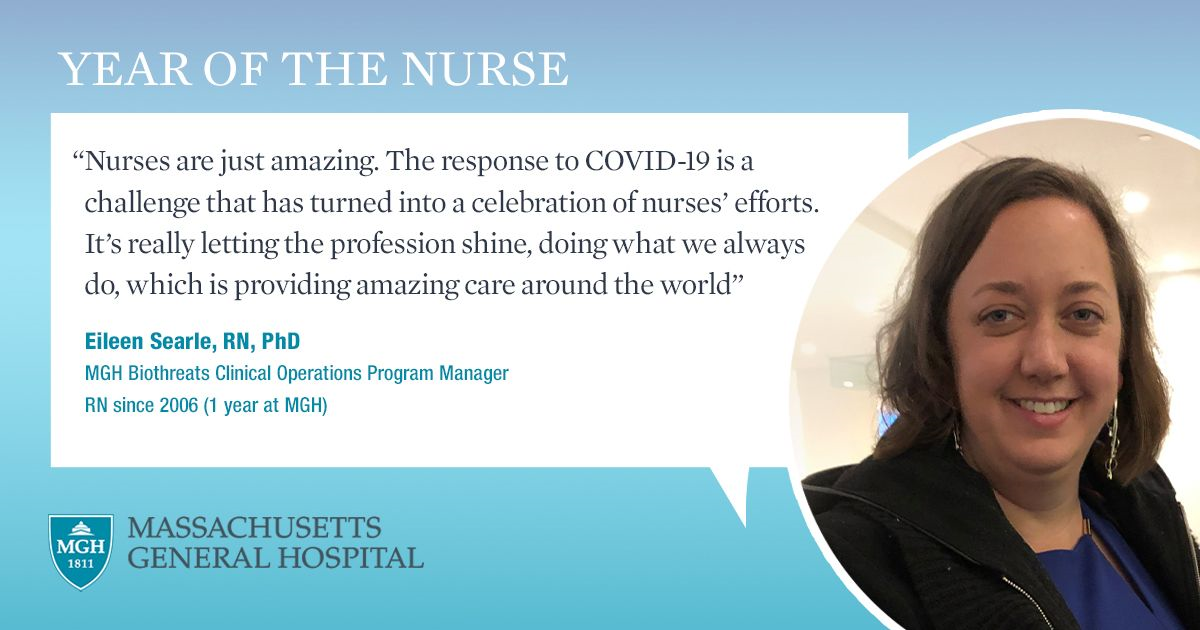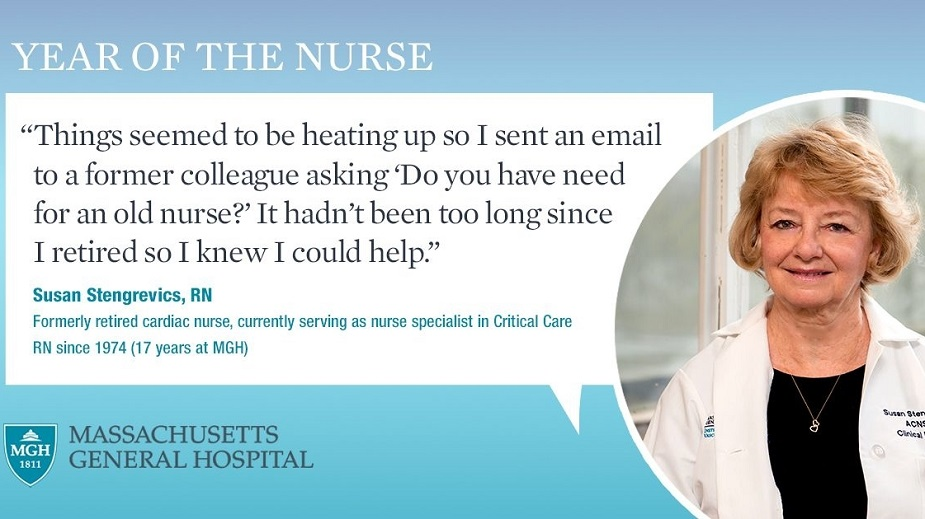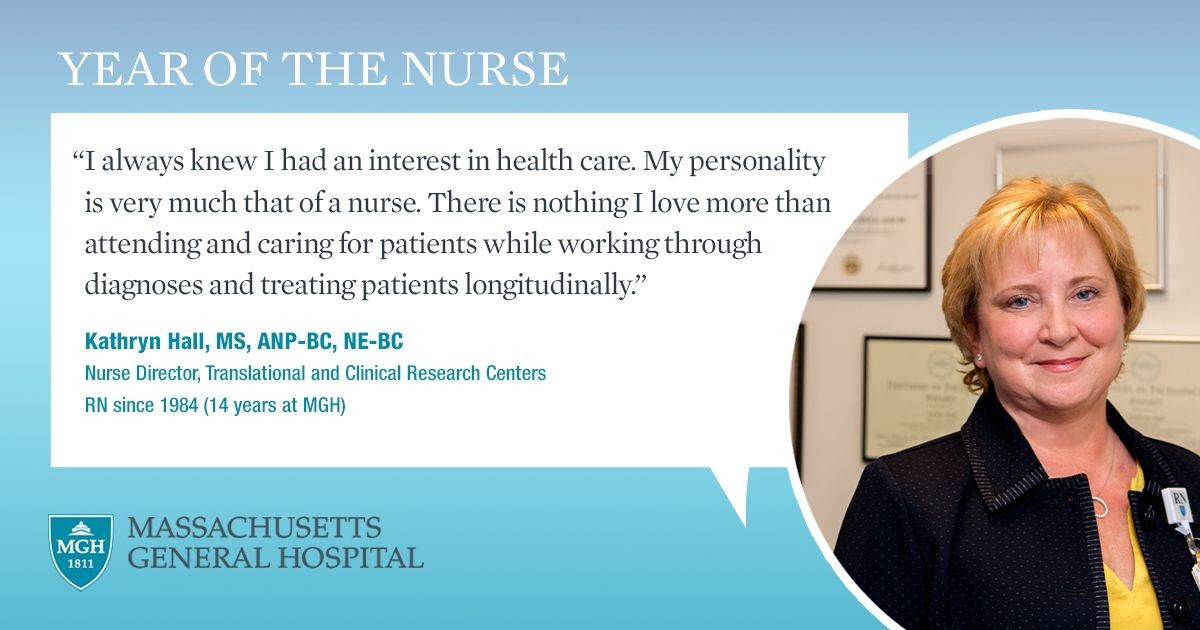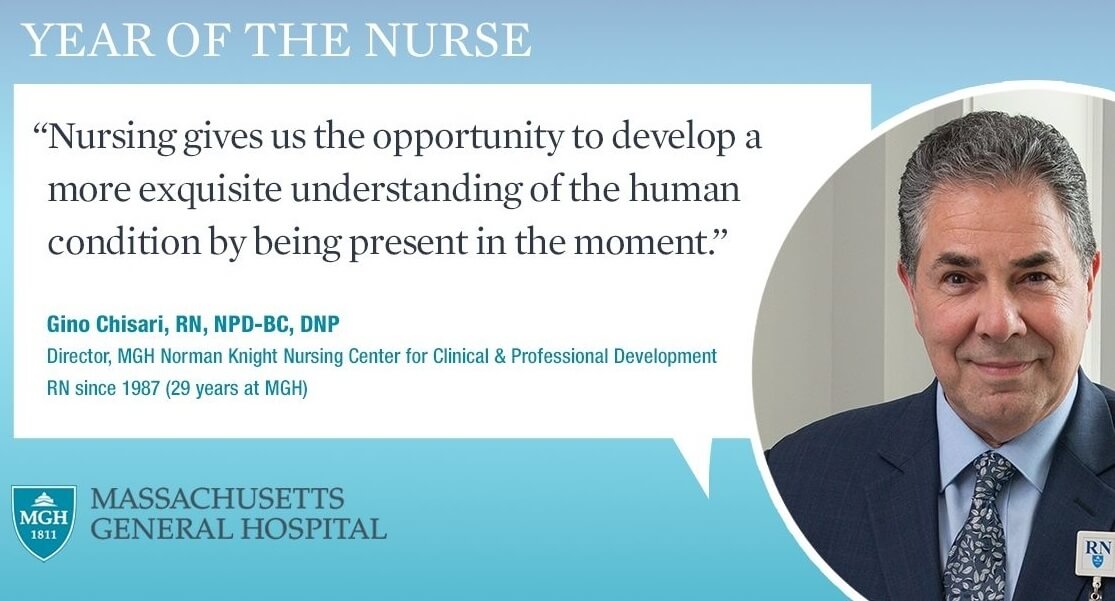NewsMay | 6 | 2020
Nurses Week 2020: The Year of the Nurse


Florence Nightingale, a pioneer of nursing, was born on May 12, 1820. In celebration of her 200th birthday, the World Health Organization declared 2020 the “Year of the Nurse and Midwife.” It’s now clear that nurses and health care providers of all kinds face extraordinary circumstances this year.
In recognition of Nurses Week, Massachusetts General Hospital nurses share their inspiration and experiences spanning the beginning of their careers to the current pandemic response.
View exhibit panels for "A Light in the Darkness: Florence Nightingale's Legacy" in PDF form here.
Eileen Searle, RN, PhD
Mass General Biothreats Clinical Operations Program Manager | RN since 2006, Has worked at Mass General for 1 year
“We make all these emergency plans in hopes that we never have to use them,” says Eileen Searle, RN, PhD, Mass General Biothreats Clinical Operations program manager. She works with colleagues in the Mass General Center for Disaster Medicine, Emergency Preparedness, Infection Control, Materials Management, Environmental Health and Safety and others to ensure the hospital is ready should an emergency such as a pandemic or patient surge arise.
With only one year under her belt, Searle did not expect to be putting her plans into action so soon in her time in the position. “In the beginning of our COVID-19 response, I spent most of my time with the staff from the Emergency Department, Medical ICU, and Bigelow 9 working on the development and implementation of trainings. It was important to see what was working and what wasn’t,” she says. “We knew needed to leverage the experience of staff, but I was blown away by the response of my colleagues.”
Searle says that almost immediately nurses with experience in the ICU and the Emergency Department were volunteering to train other nurses and lead personal protective equipment sessions. She says, “There is nothing like having a colleague say ‘You got this!’ and ‘You are doing awesome.’ Those peer supports are so important.”
Searle was inspired to go into nursing by her aunt who loved her career. “I knew I didn’t want a job where I was sitting all day, so during undergraduate school I transferred into the nursing program and have loved every minute since,” she says.
“Nursing is all about the little things that we don’t think about as being remarkable,” Searle explains. “Sometimes we just think, well this is how we practice every day, but during the COVID response efforts I have seen nurses really push to care for patients as people. They continue to go to great lengths to facilitate access to family while we maintain our visitor restrictions, remembering these patients are still mothers, brothers, spouses, sons and friends. These small acts make sure that patients know they are more than a COVID-19 patient, and in times like these, that is remarkable.”

Susan Stengrevics, RN
Formerly retired cardiac nurse, currently serving as nurse specialist in Critical Care | RN since 1974, Has worked at Mass General 17 years
Susan Stengrevics, RN, started working at the Mass General on September 11, 2001. “It was a very strange experience,” she says. “I will never forget starting work that day.”
Stengrevics knew she wanted to be a nurse since she was five years old. “It was the path I always wanted,” she says. Working mostly as a cardiac and critical care nurse, Stengrevics spent 17 years at Mass General until her retirement in 2018. “I loved nursing so much that I delayed retirement as long as I could. I went from full time to per diem just so I could stay a little longer and take care of patients.”
As the COVID-19 pandemic began making headlines, “I was watching the news,” she says, “and things seemed to be heating up, so I sent an email to a former colleague asking ‘Do you have need for an old nurse?’ It hadn’t been too long since I retired so I knew I could help. The next thing I knew I was given my new assignment and getting sent the PACU and ICU Refresher course.”
Stengrevics experience lead her to take up a role as a nurse educator as Mass General trains and expands the knowledge base of nurses that are moving into new roles in response to the COVID-19 patient surge. She helped a team develop online programs for nurses moving from medical units to the ICU and attended daily rounds following simulation trainings to ensure nurses felt comfortable with new techniques.
Her time in cardiac care left Stengrevics with a deep understanding of cardiac pulmonary bypass machines, similar to continuous dialysis machines used in the ICU. She saw the link between the machines and was asked to teach the perfusionists, who run these bypass machines, to set up and trouble shoot the continuous dialysis machines. This would enable the perfusionists to support the ICU nurses who were running the continuous dialysis if the need arose. “This would very much be a last resort, but we wanted perfusionists to be ready and confident with these skills to be able to step in to help the nurse if needed,” she says.
Stengrevics says, “Nursing has a way of highlighting every individual's value. The nurse, the patient, the physician, the support staff, the patient family—every person has something to offer to the team to help the patient get well.”
“As horrible as this situation is,” she says, “I have loved being back.”

Kathryn Hall, MS, ANP-BC, NE-BC
Nurse Director, Translational and Clinical Research Centers | RN since 1984, Has worked at Mass General for 14 years
Kathryn Hall, MS, ANP-BC, NE-BC, nurse director of the Mass General Translational and Clinical Research Centers, always knew she wanted to be in health care. “My personality is very much that of a nurse,” she says. “I just knew I had to find my niche.”
In 1984, Hall graduated nursing school and found herself inspired by a nurse practitioner she had met. “There is nothing I love more than attending and caring for patients,” she says. But it was the science of diagnosis and longitudinal care that encouraged her to become a nurse practitioner in 1988.
When Hall came to Mass General 14 years ago she saw a growth opportunity in what was then General Research, now part of the Translational and Clinical Research Centers, for which Hall serves as nursing director. “Growing practices and building teams are real interests of mine,” says Hall. Under her leadership, the department has tripled in size and oversees over 200 active studies.
Since the outbreak of the COVID-19 pandemic, The Centers manage all of the COVID-19 research hospitalwide. Hall says, “The people I work with are so smart and their work is incredibly interesting. It’s been an exciting time to be in research here since we have had to evolve quickly to meet the changing needs of our programs.”
“Although my kids are grown up,” she says, “I tell them that you have to love what you do. No matter where my career has taken me, from the bedside to managing research teams, I have always been blessed to love what I do."

Susana Silva, RN
General Medicine nurse, rotating on a COVID-19 Unit | RN since 2015, Has worked at Mass General 6 years
“I am still a fairly new nurse,” says Susana Silva, RN, Ellison 11, a unit adapted to treat COVID-19 patients, “but I have loved what I do since I started. Of course, there have been struggles and fears, but the reward of learning from other passionate nurses and knowing you are helping people when they most need it has helped me overcome struggles and challenges.”
When Silva emigrated from El Salvador in 1999, she knew she wanted to work in the hospital setting. “Life has a way of directing us to our true passion,” says Silva. She was only a year into her marriage when her mother-in-law was diagnosed with cancer. Silva says she watched how the nurses treated her loved one through the physical and emotional recovery of surgery, chemotherapy and radiation. “I fell in love with nursing then and that experience made me want to go back to school and pursue this career.”
Silva graduated and became a registered nurse in 2015, but while pursuing her degree, she worked as a patient care associate at Mass General—on the same floor she now works treating COVID-19 patients. She secured that position thanks to a scholarship through the Partners’ Clinical Leadership Collaborative for Diversity in Nursing program.
“I loved working for my team from the start, everyone was so welcoming,” Silva says. “As a new graduate, I had fears, but they soon dissipated as my coworkers and my leadership team were more than supportive. I never felt alone during my transition from PCA to staff nurse, and I feel like I have grown in my practice thanks to all of them. Becoming a nurse felt like a calling, I wanted to be present and be helpful at a time when people are vulnerable and need care. Today more than ever, my calling is solidified.”
Silva applauds the COVID-19 response, which has brought nurses from across the hospital together to strengthen the support they have for one another and their patients. “Our patients are not only vulnerable, but they are also scared, their family cannot be physically present with them and this virus is new,” she says. “In a way, health care workers—and not just nurses—have become like an extended family for them. We show up to work for one another, for our patients, for our families, for our community. This experience has proven what we already knew, that we are stronger together.”

Aileen Patel, RN
Medical Intensive Care Unit | RN since 2006, Has worked at Mass General for 10 years
Last summer, Aileen Patel, RN, of the Medical Intensive Care Unit (MICU), and her family went on vacation to upstate New York. “We visited the state park at FDR’s home and walking through the house I saw a poster that reminded me of Rosie the Riveter that said, ‘Become a nurse. Your country needs you.’ I have been thinking a lot about that sign lately and it seems especially appropriate now.”
At first, Patel went to school for exercise physiology. Her first job at Mass General after college was in neuroendocrine research. “My mother was a nurse and I just thought I didn’t want to do what she did, that’s why I took such a varied path to find my role,” she says. “When I was thinking about graduate school, I realized I didn’t really want to be a scientist.”
When Patel did decide to become a nurse, she knew she wanted to work where the action was. “During nursing school, I wanted to be placed in a Critical Care Unit, but there was no room. I was placed in the MICU instead and I loved it,” she says. “I loved the people there, I loved the intensity and I loved being a part of the team.”
Since then, Patel has not been able to stay away from the Mass General MICU for long. She was hired following her graduation from nursing school in 2006, but in 2010, she and her family moved so her husband could complete his residency out of state. “We moved back to Boston in 2014, and all I wanted to do was be back in the MICU.”
For a nurse whose career has been centered in the ICU setting, the response to the COVID-19 pandemic has not been as much of a change as it is for some of her nursing colleagues. “In the ICU, patients always demand non-stop care,” Patel says. “The largest change has been seeing how sick all of these patients are and seeing such young people continuing to come in.”
Patel says that it is the support of her colleagues that keep her going, and the teamwork in the ICU is one of the things that drew her to begin with. “There are a lot of group texts sharing and celebrating small achievements…and a lot of carbs. We could not be doing this without our second family. We can read each other’s non-verbal cues, eye contact and tone of voice even with our masks on. That’s what makes me go back every day. Because I trust my colleagues so implicitly.”
Says Patel, “the response to COVID-19 has put a spotlight on how vital the role of nursing is for patients—pandemic or not. I recently shared on social media the nurses poster photo I took on vacation last summer. It reminds me that this country needed nurses then, now and all of the times in between.”

Gino Chisari, RN, NPD-BC, DNP
Director, Mass General's Norman Knight Nursing Center for Clinical & Professional Development | RN since 1987, Has worked at Mass General 29 years
“Professional development is my primary love because it allows me to contribute to patient care in a different way than being at the bedside,” says Gino Chisari, RN, NPD-BC, DNP, director of Mass General's Norman Knight Nursing Center for Clinical and Professional Development. "Nursing gives us the opportunity to develop a more exquisite understanding of the human condition by being present in the moment."
Chisari began his career at Mass General in direct patient care when he graduated as a licensed practical nurse (LPN) from the hospital’s nursing school in 1984. Throughout his career, Chisari has worked as a registered nurse, a clinical nurse specialist and project manager. “I am grateful that through the financial and scheduling support of Mass General, I was able to go from LPN, to RN, to receiving my doctorate,” he says.
In his current role as the director of the Knight Center, Chisari leads professional development efforts for Patient Care Services staff, encouraging his nursing colleagues to develop competencies that lead to better patient care. “I have always been committed to professional associations, networks and development because they have the power to contribute to nursing at a higher level,” Chisari says. “Developing key competencies allows nurses to continue to grow. It’s about making sure they have the right tools, at the right time.”
During the response to COVID-19, Chisari has observed the recognition nursing has received. He notes that during any national disaster, natural disaster, pandemic or war, nurses are some of the first people there to help but has been struck by the idea that the Year of the Nurse coincided with this global pandemic. “We, as nurses, have had a particular visibility that we have not had before,” he says. “But it’s important for us to be open to learning from all that is occurring around us because we are all learning together and have the power to change the future for the better.”

Type
Centers and Departments
Topics
Nursing & Patient Care Services
Nursing & Patient Care Services at Mass General works hospital-wide to deliver the highest quality patient care and excellence in clinical practice.
